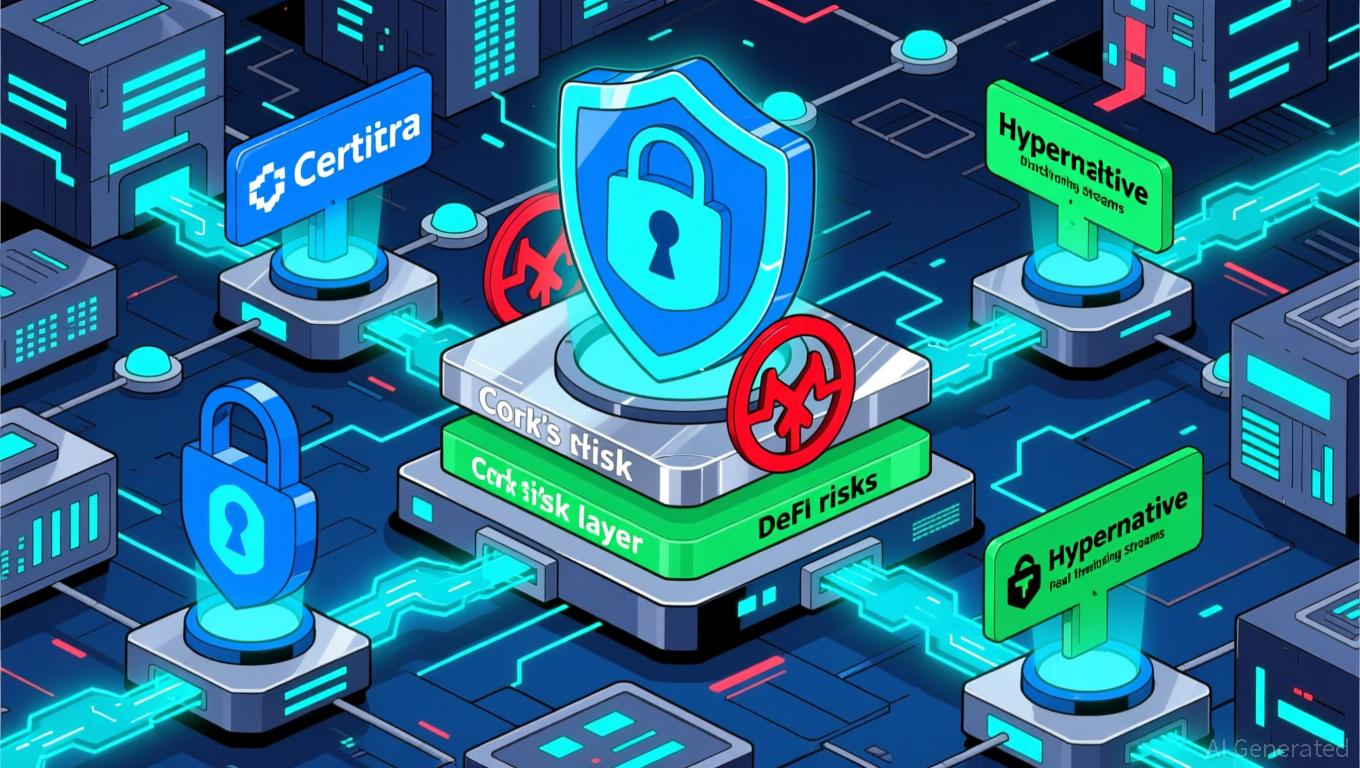Security by Design: Certora, Cork, and Hypernative Set New Benchmarks for DeFi Protection
- Certora, Cork, and Hypernative partner to enhance Web3 security via "security by design" principles, combining formal verification, programmable risk infrastructure, and real-time threat detection. - Certora’s recent collaboration with Balancer prevented a $4.1M loss by identifying critical vulnerabilities in DeFi pools, highlighting the urgency of proactive security measures. - The partnership integrates Certora’s formal verification, Cork’s risk modeling, and Hypernative’s real-time analytics to addres
Certora, Cork, and Hypernative have formed a strategic alliance to transform security protocols within the Web3 landscape, with a focus on integrating "security by design" into blockchain frameworks. This partnership
Certora, a leader in blockchain security, has already proven its value in risk reduction. In a recent collaboration with
The alliance with Cork and Hypernative builds upon Certora's strengths in formal verification, a technique adopted by protocols such as

The necessity for such joint efforts is underscored by recent DeFi security incidents. Balancer's V2 pools, for example, suffered multiple attacks, including a $116 million exploit in 2023. Although the V3 version was not impacted, these events stress the importance of ongoing security reviews and timely upgrades. Certora's intervention in the $4.1 million incident
Gal Sagie, Hypernative's CEO, pointed out the wider significance of this collaboration: "Our goal goes beyond blocking malicious actors; we're setting higher risk management benchmarks for the sector as a whole." Embedding security by design
As DeFi platforms expand, the partnership among Certora, Cork, and Hypernative marks a significant move toward security standards fit for institutions. By uniting formal verification, risk assessment, and real-time surveillance, the alliance seeks to build greater confidence in Web3—a vital development as blockchain technology gains traction in mainstream financial sectors.
Disclaimer: The content of this article solely reflects the author's opinion and does not represent the platform in any capacity. This article is not intended to serve as a reference for making investment decisions.
You may also like
The Rapid Growth Driving Internet Computer (ICP) Forward
- Internet Computer (ICP) gains momentum via strategic partnerships with Azure and Google Cloud, enhancing scalability and enterprise integration. - Deflationary token model and 1.2M+ active wallets drive adoption, supported by DeFi growth and low-cost smart contract execution. - Cross-industry collaborations, like medical TPU material development, highlight blockchain's expanding utility beyond traditional finance. - Regulatory shifts, including SEC rules, pose challenges but may strengthen ICP's institut

Bitcoin News Today: Bitcoin Faces $106K Challenge as Whales, Miners, and Broader Economic Factors Intersect
- Bitcoin nears critical descending channel, risking a sharp drop to $88,000 if $106,500 resistance fails, per analysts. - Mixed signals emerge: $1.15M ETF inflow and 23% trading volume surge hint at short-term stability, but macroeconomic headwinds and whale dumping persist. - Institutional adoption grows under Trump's policies, yet miners face existential threats as Bitfarms shifts to AI amid unprofitable operations. - Market bifurcation deepens: Wall Street thrives on digital assets while domestic minin

Aave News Today: Aave’s No-Fee Initiative Brings DeFi Access to All Across Europe
- Aave Labs secures MiCA approval in Ireland, enabling zero-fee euro-to-crypto conversions via its Push service across the EEA. - The fee-free model challenges traditional fintech and CEXs, aiming to reduce DeFi adoption barriers by eliminating transaction costs. - Ireland's regulatory environment attracts DeFi firms like Aave, following Kraken's MiCA authorization and Aave's Stable Finance acquisition. - With $312B stablecoin market cap in 2025, Push's $542M 24-hour volume highlights its role in scaling a

Post-FTX digital asset exchanges simplify futures offerings to comply with regulatory requirements
- Binance delisted RUNEUSD futures to align with post-FTX regulatory demands and evolving user preferences. - The move follows industry-wide transparency efforts like proof-of-reserves initiatives after FTX's 2022 collapse. - Post-FTX trends show growing demand for DeFi solutions and institutional-grade crypto products with enhanced compliance. - Challenges persist in balancing innovation with regulation as exchanges like Binance recalibrate strategies amid shifting market dynamics.
